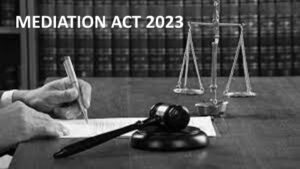Table of Contents
Introduction
The Mediation Act of 2023, after being passed by the Rajya Sabha on August 1, 2023, and by the Lok Sabha on August 7, 2023, received the assent of the President on September 14, 2023, and has been enacted by the Central Government Notification No. CG-DL-E-15092023-248775 “The Mediation Act of 2023” (“Act”), extending to the whole of India. However, the Act will come into force on a date that the Central Government may notify.
What is Mediation?
Mediation is a voluntary, binding process in which an impartial and neutral mediator facilitates disputing parties in reaching a settlement. Mediation, in basic terms, is the process of intervention by a third party between two contesting parties with the aim of reconciling them or persuading them to settle their dispute without going into litigation.
Mediation is not a new process and is even mentioned in Section 89(1) of the Code of Civil Procedure, 1908, which was introduced by the Civil Procedure Code (Amendment) Act of 1999 and provides for the courts to refer parties to arbitration, conciliation, judicial settlement, or mediation for dispute resolution.

Applicability
As per Section 2 of the Mediation Act 2023, the Act shall apply to mediations where:
i. All parties habitually reside or are incorporated in or have their place of business in India, or
ii. The mediation agreement provides for dispute resolution in accordance with the Act, or
iii. There is an international mediation, or
iv. One of the parties to the dispute is the Central Government or a State government or agencies, public bodies, corporations, and local bodies, including entities controlled or owned by such government, and where the matter pertains to a commercial dispute, or
v. The dispute is deemed appropriate and notified by the Central Government or a State government from time to time, for resolution through mediation under this Act, wherein such governments, or agencies, public bodies, corporations, and local bodies, including entities controlled or owned by them, are a party.
It is important to note that the Mediation Bill does not contemplate the enforcement of mediated settlement agreements resulting from mediation conducted outside India.
Mediators
- Mediators may be appointed by:
- the parties by agreement, or
- a mediation service provider.
- Mediators must disclose any conflict of interest that may raise doubts about their independence.
Mediation Council of India
- The central government will establish the Mediation Council of India.
- The Council will consist of
- a chairperson,
- two full-time members (with experience in mediation or ADR),
- three ex-officio members (including the Law Secretary, and the Expenditure Secretary), and
- a part-time member of an industry body.
- Functions of the Council include (i) registration of mediators, and (ii) recognizing mediation service providers and mediation institutes.
Mediated Settlement Agreement
- Agreements resulting from mediation (other than community mediation) will be final, binding, and enforceable in the same manner as court judgments.
- They may be challenged on grounds of:
- fraud
- corruption
- impersonation
- relating to disputes not fit for mediation.
Why does India Need to Promote Mediation?
- As of May 2022, over 4.7 crore cases are pending in courts across different levels of the judiciary. Of them, 87.4% are pending in subordinate courts, 12.4% in High Courts.
- Thus to reduce the case pendency, the Mediation and Conciliation Project Committee of the Supreme Court of India describes mediation as a tried and tested alternative for conflict resolution
True Justice and Social Change
- Mediation simplifies the delivery of justice through plain language and proves to be a cost-effective alternative to traditional methods.
- The resolution arrived during mediation secures true justice for individuals where social norms are brought in consonance with Constitutional values through the exchange of ideas and flow of information.
Pre-litigation Mediation
Section 3(u) of the Act defines pre-litigation mediation as the process of undertaking mediation, as provided under Section 5, for the settlement of disputes prior to the filing of a suit or proceeding of a civil or commercial nature in respect thereof, before a court or a notified tribunal under sub-section (2) of Section 5.
Pre-litigation mediation is highly beneficial as it offers a proactive and cost-efficient means of settling conflicts before they evolve into formal, drawn-out legal battles. It promotes transparent communication, cooperation, and an adaptable approach to crafting solutions that align with the parties’ requirements and concerns. This approach saves time, money, and resources while also preserving relationships and confidentiality. Overall, it enhances the efficiency and amicability of the legal process.
The time period of the Mediation Act 2023:
Section 18 of the Act provides that mediation proceedings must be completed within 120 days from the date of the first appearance or for an extended time frame of 180 days if agreed upon by the parties.
